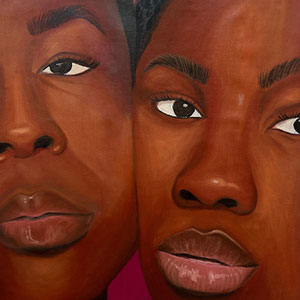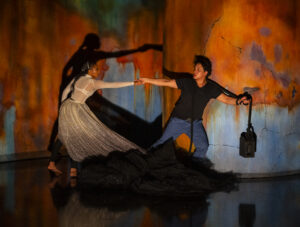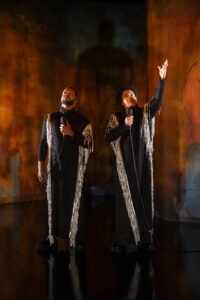
 **** “Antigone” is a remarkably bold commentary about a hero’s resistance to prevailing authority: something which can happen anywhere in almost any era. Court Theatre’s production represents a fresh new approach to this classic tragedy originally written by Sophocles in the 5th century B.C. Directed by Gabrielle Randle-Bent using text translated from the Ancient Greek by Nicholas Rudall, this play in the modern vernacular lays claim to the theme that there will always be conflict between the primacy of God’s law versus man’s desire to make himself out to be an authority figure to rival God. We see what can happen when a law flies in the face of traditional religious belief and morality and becomes antithetical to the population’s wishes. When the people ultimately rebel, those in charge of the State may subsequently lose whatever legitimacy they may have previously had. This is a show that gives us pause about the ultimate meaning of goodness and standing up to power in any society.
**** “Antigone” is a remarkably bold commentary about a hero’s resistance to prevailing authority: something which can happen anywhere in almost any era. Court Theatre’s production represents a fresh new approach to this classic tragedy originally written by Sophocles in the 5th century B.C. Directed by Gabrielle Randle-Bent using text translated from the Ancient Greek by Nicholas Rudall, this play in the modern vernacular lays claim to the theme that there will always be conflict between the primacy of God’s law versus man’s desire to make himself out to be an authority figure to rival God. We see what can happen when a law flies in the face of traditional religious belief and morality and becomes antithetical to the population’s wishes. When the people ultimately rebel, those in charge of the State may subsequently lose whatever legitimacy they may have previously had. This is a show that gives us pause about the ultimate meaning of goodness and standing up to power in any society.
At the very beginning of the play, we hear about the specific example of Rosa Parks refusing to take a back seat on a Montgomery, Alabama city bus in December of 1955. Akin to the story of “Antigone”, this real event focused on a young woman with a higher moral calling who led the way in disobeying the civil authorities. The result was the Montgomery Bus Boycott, an event that once became a focal point, among others, in the Civil Rights Movement of the late 1950s and 1960s.
For those as yet unfamiliar with the ancient tale, there has been a civil war in Thebes that pit two brothers Polynices and Eteocles, who were both killed at each other’s hand. King Creon, their uncle (Timothy Edward Kane), decides to give Eteocles a state funeral because of his willingness to preserve law and order and the present government whereas Creon declares that Eteocles’s brother Polynices is an enemy of the State, and therefore his dead body should not be buried; instead Creon mandates that it should rot in the sun. Polynice’s sister Antigone (Aeriel Williams) is outraged by this affront to the gods and their decrees, and she insists on secretly burying her brother, even if this is deemed against the law of Thebes. Her sister Ismene (Ariana Burks) tries to talk her out of this, but Antigone insists on doing so, even though she knows she will be caught and most likely will be punished by death for her defiance. At the same time, Antigone has been pledged to marry Creon’s son Haimon (Matthew C. Yee), and Haimon ultimately sides with her: in favor of the dictates of the gods and not the dictates of man. Perhaps the character of Tiresias (Cheryl Lynn Bruce) is the most poignant of all. Tiresias is the seer and prognosticator who is blind, a prophet who cares nothing about profit but gains from telling the truth of the situation: that if divine law is not immediately followed, the result is ruin for everybody.
What makes this particular production of “Antigone” so unique is its African American vibe and that the dialogue is complimented by rap songs and sound effects using microphones with intentional clicks, pops, chirps, and burps. The simultaneous and repartee singing, which features the cast’s beautiful and talented voices plus limited choreography, help to enhance the story’s meaning and sharpen its impact. Vocal arrangements by Janine Stroemer-Cheeks could not be any better, plus the complex rhythms emanating from the box drum are exceptional.
All throughout, two poets beautifully dressed in black robes with silver fringes narrate the show and provide commentary on the events taking place. Danielle Davis, who plays Demophilus, and Cage Sebastian Pierre, who plays Euboule, sing beautifully together. Talented in creating unusual acoustics, they are joined by Julian Parker, who performs as the Watchman Who Becomes Messenger and as a guard.
Thanks to John Culbert’s extraordinarily simple but effective scenic design, one of the most thrilling parts of the show is seeing this gorgeous set when you walk into the theatre. The colors, design, and shape of this wall-sculpture seem to resemble a map of the ancient world with its blues (representing water) and its rust (representing land). Reminiscent of Richard Serra’s tall and wavy work, made out of corten steel, the sculpture contains a curved aisle within it, such that we can watch the actors walk between these two sections. In combination with the brilliant lighting by Keith Parham, the audience can often see ahead of time who is going to enter the scene. One can recognize King Creon, for example, in shadow before he takes the stage… and we know it is him! This type of illumination is reminiscent of Plato’s images of shadows being projected against a wall, in yet another tribute to the Ancient Greeks. For the most part, I liked the lighting choices but not all. I understood why the scene got completely dark when Antigone was contemplating her dim future, but I think the lighting should have gradually come on sooner and with some reason. Perhaps she could look into darkness at first, and then the moon could slowly rise above the horizon. This would add some light to the scene and more focus for her attention. Basically, having the audience stare too long into the darkness loses its effect after awhile.
The music makes up for lots of things that could have been done somewhat better, such as sound design. There are too many moments when the voices are too faint, such as near the beginning when Antigone and Ismene have their profound conversation about their brother’s death and lack of burial. In contrast, the sound design that goes along with the singing and use of microphones is excellent.
Another unevenness has to do with the costumes. I like the contemporary styles, but they are all over the place. The black gowns with the silver tasseling nicely convey power and authority. And the geometric hat worn by Demophilus reminded me of the ones worn by Guinan, the wise character played by Whoopi Goldberg in episodes of “Star Trek: The Next Generation.” Tiresias is appropriately dressed in a garment which imparts strength and believability. But I did not care for Antigone’s outfit at all, with her translucent blouse and glittery silver miniskirt, possibly resembling what a patron might wear at a nightclub or a guest at a holiday party. To my mind, this is not a dignified enough outfit, considering that she is the hero who alone wants to follow God’s law. Then there is Ismene’s outlandish pink dress, which reminded me of what a five-year-old would want their fairy princess to look like; it’s a style that minimizes the power of her character. I also couldn’t understand why she had to turn her wiglet around while performing. The Watchman’s yellow African batik outfit with an array of symbols on it makes for an interesting costume, but in general, his outfit seemed almost a bit too casual and not necessarily something a guard or a messenger might wear (at least, the way I imagine it).
In 1944, Jean Anouilh wrote his play “Antigone” as a vehicle of French resistance to Nazi rule in Vichy France. Similarly, Court Theatre’s version revamps the same story to analogize the resistance of African Americans to the injustices of Jim Crow and racial segregation. Note that King Creon (who makes the unjust law) is being played by a white actor whereas those who have been oppressed are being played by minority actors. This is no accident and adds an extra dimension to the story. In general, when Antigone refuses to compromise her moral and religious beliefs, she becomes a forceful model for any modern or ancient hero. We witness the extent to which she chooses to fight and die in support of a righteous cause. In addition to this being a tale about the importance of battling tyrannical forces and appealing to a Higher Power for justice, it is the addition of music and other flourishes that make the show particularly entertaining and accessible to those of all communities.
“Antigone” is playing through March 2, 2024, at Court Theatre, on the University of Chicago campus, 5535 S. Ellis Avenue, in Chicago.
Tickets: $56-$88.
Student, group, and military discounts available.
As part of Chicago Theatre Week, Court Theatre is offering $30 tickets to select performances of “Antigone.” Purchase discounted tickets online with the code CTW24 or by calling the box office at 773-753-4472 and mentioning the code.
Performance schedule:
 Wednesdays, Thursdays, and Fridays – 7:30 p.m.
Wednesdays, Thursdays, and Fridays – 7:30 p.m.
Saturdays and Sundays – 2:00 p.m. and 7:30 p.m.
Accessible Performances:
Touch Tour on February 24, at 12:30 p.m.
Audio Description and ASL Interpretation on February 24th at 2:00 p.m.
Open Captioning on February 25th at 2:00 p.m.
For further information and to purchase tickets, go to https://www.courttheatre.org/ or phone the box office at 773-753-4472.
Note that this production of “Antigone” has been extended through Black History Month.
To see what others are saying, visit www.theatreinchicago.com, go to Review Round-Up and click at “Antigone”.






More Stories
“Judgement Day”
“Bluey’s Big Play” reviewed by Tommaso Casati
“Beautiful: The Carole King Musical”